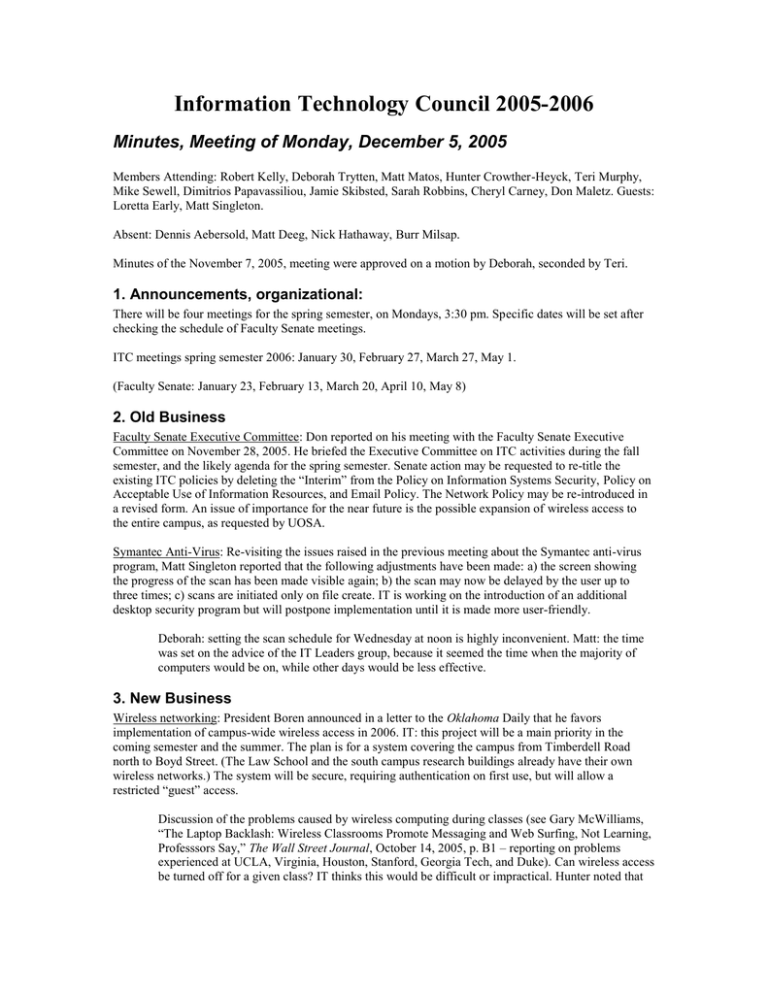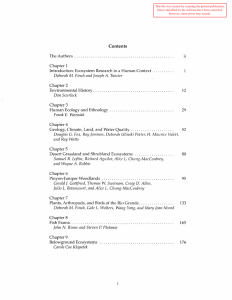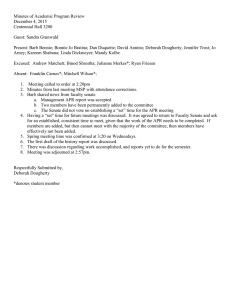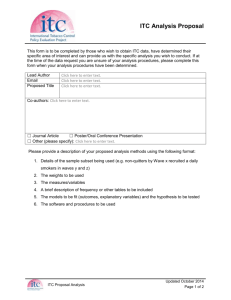Minutes from December 5, 2005
advertisement

Information Technology Council 2005-2006 Minutes, Meeting of Monday, December 5, 2005 Members Attending: Robert Kelly, Deborah Trytten, Matt Matos, Hunter Crowther-Heyck, Teri Murphy, Mike Sewell, Dimitrios Papavassiliou, Jamie Skibsted, Sarah Robbins, Cheryl Carney, Don Maletz. Guests: Loretta Early, Matt Singleton. Absent: Dennis Aebersold, Matt Deeg, Nick Hathaway, Burr Milsap. Minutes of the November 7, 2005, meeting were approved on a motion by Deborah, seconded by Teri. 1. Announcements, organizational: There will be four meetings for the spring semester, on Mondays, 3:30 pm. Specific dates will be set after checking the schedule of Faculty Senate meetings. ITC meetings spring semester 2006: January 30, February 27, March 27, May 1. (Faculty Senate: January 23, February 13, March 20, April 10, May 8) 2. Old Business Faculty Senate Executive Committee: Don reported on his meeting with the Faculty Senate Executive Committee on November 28, 2005. He briefed the Executive Committee on ITC activities during the fall semester, and the likely agenda for the spring semester. Senate action may be requested to re-title the existing ITC policies by deleting the “Interim” from the Policy on Information Systems Security, Policy on Acceptable Use of Information Resources, and Email Policy. The Network Policy may be re-introduced in a revised form. An issue of importance for the near future is the possible expansion of wireless access to the entire campus, as requested by UOSA. Symantec Anti-Virus: Re-visiting the issues raised in the previous meeting about the Symantec anti-virus program, Matt Singleton reported that the following adjustments have been made: a) the screen showing the progress of the scan has been made visible again; b) the scan may now be delayed by the user up to three times; c) scans are initiated only on file create. IT is working on the introduction of an additional desktop security program but will postpone implementation until it is made more user-friendly. Deborah: setting the scan schedule for Wednesday at noon is highly inconvenient. Matt: the time was set on the advice of the IT Leaders group, because it seemed the time when the majority of computers would be on, while other days would be less effective. 3. New Business Wireless networking: President Boren announced in a letter to the Oklahoma Daily that he favors implementation of campus-wide wireless access in 2006. IT: this project will be a main priority in the coming semester and the summer. The plan is for a system covering the campus from Timberdell Road north to Boyd Street. (The Law School and the south campus research buildings already have their own wireless networks.) The system will be secure, requiring authentication on first use, but will allow a restricted “guest” access. Discussion of the problems caused by wireless computing during classes (see Gary McWilliams, “The Laptop Backlash: Wireless Classrooms Promote Messaging and Web Surfing, Not Learning, Professsors Say,” The Wall Street Journal, October 14, 2005, p. B1 – reporting on problems experienced at UCLA, Virginia, Houston, Stanford, Georgia Tech, and Duke). Can wireless access be turned off for a given class? IT thinks this would be difficult or impractical. Hunter noted that the professor can require laptops to be closed. Deborah said she does not treat web surfing as a problem in her classes, unless it disturbs students near the perpetrator. Equipment maintenance and up-grades: Don asked about the scheduling of equipment maintenance throughout the campus system. IT reports that all equipment is monitored and the newest equipment can be monitored in real time. There is a schedule of maintenance and up-grades for all routers/switches. Core equipment is replaced every three years, “edge” equipment every five years insofar as possible. For some older buildings and for the many non-prosperous departments, an additional problem is the low quality of the wiring installed when the network was first created. In these cases, the current cabling prevents an effective up-grade of the routers/switches. While IT has built a schedule for the regular replacement of inadequate equipment and wiring, the plan has not yet been funded. Replacement of the 4x4 userid containing social security digits: IT is working on a plan to convert the old 4x4 to a 4x4 based on the new OU personal identification numbers, and sought input from ITC about whether this should be a ‘voluntary’ changeover at the option of the individual user or a ‘mandatory’ changeover as with the conversion of personal identification numbers for the entire campus community in 2005. Deborah: the use of social security digits is inexcusable. Teri and Robert: the last four digits of one’s social security number may be sufficient for identity thieves to access personal information elsewhere. Hunter and Robert: generally it is preferable to make a change ‘voluntary.’ Deborah: the least technically skilled persons are the ones likely not to choose to change the userid and yet are also the ones most vulnerable; on these grounds, it is best to make the change mandatory and campus-wide. Deborah: considering that the danger inherent in the use of the social security numbers has been under discussion for years, the University makes itself liable by not addressing the problem. IT: there are some parts of the campus system that may encounter significant problems in a changeover (issues: WebCT accounts, possibly the authentication system in use by the Library). IT does not wish to proceed on a mandatory changeover without guidance from ITC about the best method. Teri: moved that IT implement a mandatory changeover to a new userid without social security digits, to take effect at the beginning of the 2006-07 academic year. Second: Hunter. Further discussion, especially of implementation difficulties on the part of IT. Deborah: moved to table the motion in order to provide IT with opportunity for further planning, with a report on feasibility to be provided at the next ITC meeting. Second: Hunter. Motion passed unanimously. Adjourned: 4:55 pm. Don Maletz




